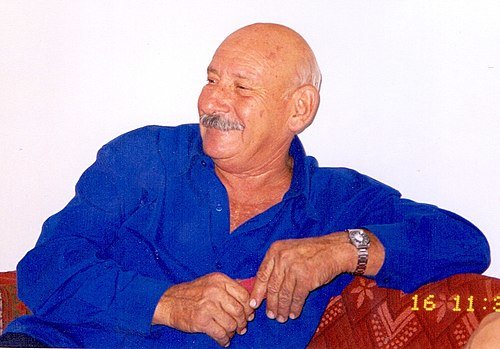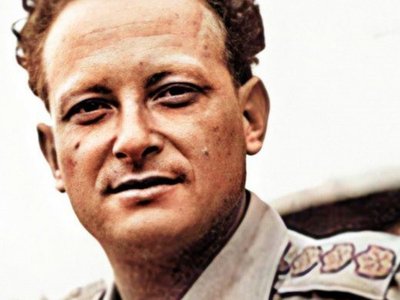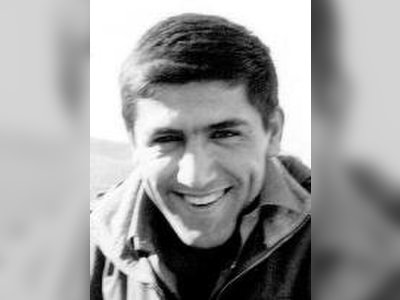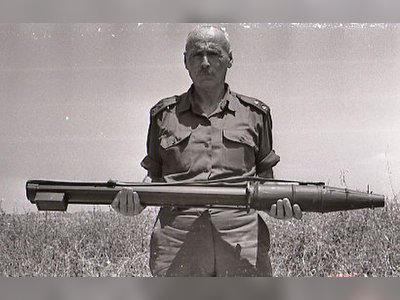Shlomo Baum - A Legacy of Courage and Leadership

Shlomo Baum's life was marked by unwavering courage, pioneering contributions to the Israeli military, and a steadfast commitment to his political beliefs. His legacy continues to influence Israel's military and political landscape to this day.
Shlomo Baum (June 21, 1928 - January 17, 1999) was a prominent figure in Israel's military history, renowned for his service in Unit 101 and his pioneering role in retaliation operations during the 1950s. He was among the key architects of Israeli special forces, including the paratroopers, special units, and infantry. Additionally, he was a prominent voice on the political right in Israel.
Biography
Born in Kfar Yehezkel to David and Tzipora Baum, who were among the founders of the settlement, Shlomo received his first firearm from his father at the age of 8 and began participating in security activities alongside his father.
In his youth, he was known as a tough character, possessing both physical strength and a loud voice. He was involved in several altercations, and there were rumors that he once fought and killed a horse in a fistfight.
However, in an interview, Baum claimed that the horse had simply gone into shock from the blow. Despite his tough exterior, he was also an intellectual with a broad knowledge of the history of Israel, military history, and the region. According to Uri Milstein, Shlomo Baum understood as early as 1954 that Israel's most dangerous adversary was not Egypt or Syria, but rather the Palestinians, who posed a significant threat to Israel.
Military Career
At the outset of the War of Independence, Baum participated in one of the first attacks by the "Haganah" organization on an Arab convoy near the city of Beit She'an. He underwent training as a combatant and attended courses for unit commanders. Later, he joined the Golani Brigade. In 1949, he began an officers' course but was dismissed due to disciplinary issues.
Under the pressure of his commander in Golani, Avraham Yafe, he was eventually allowed to complete the following course. In 1950, he joined the Golani reconnaissance unit under the command of Ariel Sharon, and their paths became closely intertwined. Serving in this unit, Baum functioned as a platoon commander and was responsible for reconnaissance. When Sharon left for further studies, Baum also left the IDF and returned to his parents' farm in Kfar Yehezkel.
In July 1953, Baum was called upon by Sharon to participate in the first retaliation operation in the village of Nahf, located beyond the Jordanian border. The participants in this operation formed the nucleus of what would become Unit 101. In August 1953, together with Ariel Sharon, Baum initiated the establishment of a new commando unit - Unit 101 - and served as its deputy commander.
Baum was instrumental in shaping the unit's combat doctrine, designing training programs, training soldiers, and engaging in intelligence gathering and the extraction of lessons learned—a practice that was nearly non-existent in the IDF at that time. He participated in various retaliatory operations as a commanding officer and was notably in charge of the unit that blew up houses in the village of Qibya during Operation Kibbutz.
In January 1954, Unit 101 was disbanded and incorporated into the Paratroopers Brigade 890. Baum was appointed as a platoon commander in the rank of lieutenant. He fought in Operation Kadish in 1954. In 1963, he suffered a heart attack and was discharged from active duty.
During the Six-Day War, Baum served as part of the armored brigade. After the war, he returned to regular service and was appointed as the commander of the reconnaissance unit of the 7th Brigade in 1968. During the Yom Kippur War, he devised Operation Raviv and served as the deputy commander of the force. This operation involved a daring raid by Israeli forces on the Egyptian shore of the Suez Gulf, causing significant damage over a period of approximately ten hours before safely withdrawing to the Sinai Peninsula.
In the early 1970s, he was called upon to assist Ariel Sharon in suppressing the armed Palestinian organizations in the Gaza Strip. Baum volunteered to serve in Sharon's command, who was then a major general and the head of Southern Command, as the commander of the regional intelligence division with the rank of captain.
During his service there, he initiated the establishment of the "Rimon" unit, which engaged in unconventional warfare and eliminated many of the wanted individuals in the Gaza Strip. This unit, led by Meir Dagan, consulted extensively with Baum. In a famous incident, the unit, at Baum's initiative, neutralized a large cache of explosives planted by members of the PLO in Gaza. The explosives were detonated without delay, destroying the rockets inside.
In 1972, Baum was severely injured in a car accident. During the Yom Kippur War, he served as the commander of Reserve Battalion 112, which operated on the southern front without engaging in direct combat. In 1975, he retired from regular service with the rank of brigadier general. He served in the reserves during the Peace for Galilee War. Throughout his service, he was known as a sharp and outspoken critic of the military's operational methods and culture.
Political Activity
In the 1960s, after his first departure from the IDF, Baum was active in the Rafi Party. Following his second retirement from the IDF in the 1970s, his positions and opinions placed him firmly on the right side of the Israeli political spectrum. He opposed the peace agreement with Egypt, and due to disagreements over the Sinai withdrawal, he severed ties with Ariel Sharon. Baum gravitated toward right-wing extremists, particularly the Gush Emunim movement, and became an active participant in the Temple Mount Faithful movement.
In December 1994, together with Major General (res.) Moshe LeShem, he founded the right-wing organization "Shenit Gamla Lo Tipol" (A Second Gamla Shall Not Fall).
For years, he hosted a program on the pirate radio station "Channel 7," where he passionately opposed the Oslo Accords, coining the term "Oslo criminals" to describe its architects.
Personal Life
Since the 1960s, after leaving Kfar Yehezkel, Baum lived in the Abu Tor neighborhood of Jerusalem, which at the time was located near the Jordanian municipal boundary. Over the years, he became a recognizable figure in the neighborhood, often seen with his shaved head, armed with a pistol, and accompanied by one of his attack dogs. His home also became a hub for Jerusalem's intellectual and military elite, hosting gatherings with a wide range of participants, including prominent artists and high-ranking military officers.
Late in life, he married Ilana, a journalist, and they had three children. Despite his fierce exterior, Baum was known to be a loving husband and father. Throughout his life, he remained a distinctive figure in Jerusalem's cultural and military circles.
Shlomo Baum passed away in May 1999 at the age of seventy after a long illness. A street in the Har Homa neighborhood of Jerusalem was named in his honor.
- שלמה באוםhe.wikipedia.org


